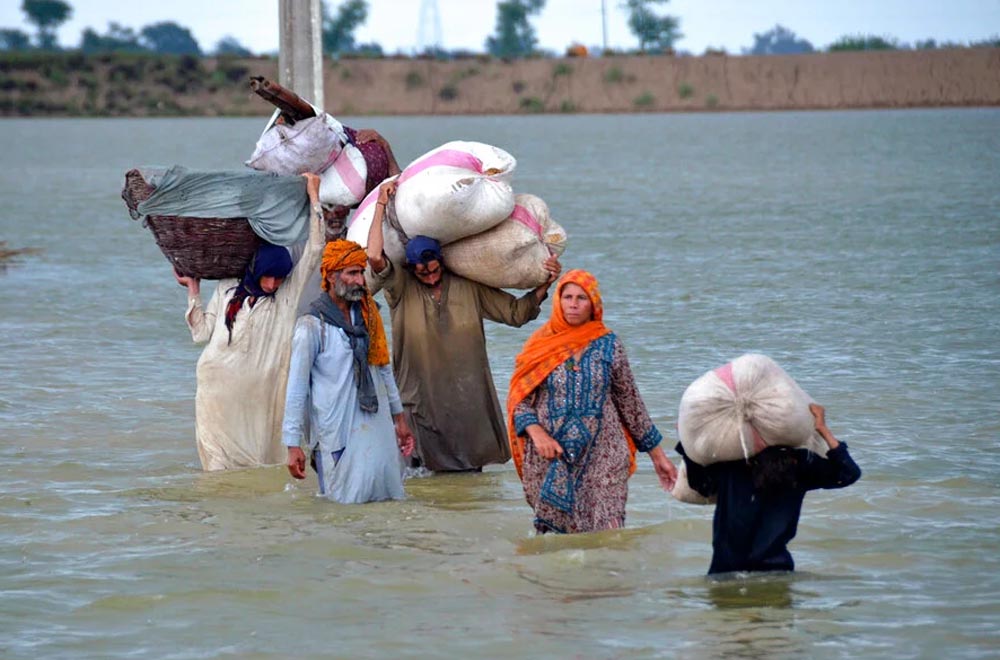Disclaimer: The Eqbal Ahmad Centre for Public Education (EACPE) encourages critical and independent thinking and believes in a free expression of one’s opinion. However, the views expressed in contributed articles are solely those of their respective authors and do not necessarily reflect the position or policy of the EACPE.
Climate change is here and is slapping on our faces as we hold our eyes tightly closed to shun it as a nightmare. The longer we will keep our eyes shut the more blows we will have on our faces.
Being on the list of countries most affected by climate change, Pakistan needs a proactive approach. Adhoc-based, election-centred policies are good enough to get the votes but disasters can be undone only with actual work, on real grounds by competent people who can deliver as well.
In 2005, northern and central parts of the country were struck by an earthquake. Later in the day, the media revealed harrowing stories of loss of lives and property which could have been prevented if the house constructed in the hilly areas had followed engineering standards. Many of my friends at that time were preparing for their undergrad entrance exams. The calamity caught us unprepared broadcasted to the local media. To date, the rehabilitation in those areas has not been wholly accomplished.
Being on the list of countries most affected by climate change, Pakistan needs a proactive approach.
In 2010, Pakistan experienced one of the highest flood levels. The floods damaged almost 8,000 schools across the country. About 5,000 other schools had become shelters for the displaced, depriving children of education. The criminal negligence in delaying the construction of dams was largely stressed. Government officials were seen shaking hands with foreign dignitaries trying to generate momentum. However, nothing substantial happened.
Fast forward; the floods in 2022 are wreaking the same havoc as a decade ago. Nearly a thousand people have died across the country and hundreds of thousands have been displaced. As usual, the response is limited to rescue services, aid, collecting donations and political scoring.
A few months ago, the forest fire in Balochistan faced a similar response. The fire turned over 30% of precious pine to ashes. While the flames have finally died down, our failure to lose a single night’s sleep over such an irrevocable national loss was abhorrent.
Natural disasters are already posing an existential threat to the country. The destruction is on the rise because we face calamities faster than we can rehabilitate.
Flood control needs long-term planning. It is not deterred by politicians opposing the construction of dams because people might be relocated to other places with compensation where it will be difficult for them to win elections. Floods are managed, controlled and prevented with dams, reservoirs and weirs, not by mere words.
All of those friends I mentioned at the start of this script have now received their doctorates! Unfortunately, again this time we are told the floods got us unprepared. So how much time do we need to prepare?
While Pakistan needs to develop an effective pro-active disaster response for the future, it must also be using diplomatic tactics to present its unique case internationally. Pakistan ranks 8th among countries most vulnerable to climate crises despite contributing less than 1% to global carbon emissions.
Pakistan should assign a parliamentary committee to simulate the future calamities striking the country in the next three decades and prepare a report on the cost of prevention, mitigation and rehabilitation.
The country needs to knock on the doors of international bodies of justice and climate change such as The United Nations Framework Convention on Climate Change and the International Court of Justice to make it binding on the countries producing a major share of carbon emission to compensate Pakistan for its loss due to the climate change.
This can secure the future of the country.
While my friends’ kids won’t be able to comprehend my Op-ed well enough as they are still in elementary classes. I wish if they ever read the newspaper archives and find this piece in the future, they don’t see then their countrymen left at the mercy of an exceptional monsoon season.
I hope they will not be told that we are caught unprepared — once again!
About the Author
 Muhammad Ali Falak is a Fulbright PhD candidate at Texas A&M University and graduated from The University of Tokyo. He has worked at different positions in Pakistan, Japan and the USA. His work experience includes teaching in universities, research, consultancy and project management and several other businesses. He is also serving as a Senator in the Graduate Professional Student Government at Texas A&M University. Visit his Linkedin page here.
Muhammad Ali Falak is a Fulbright PhD candidate at Texas A&M University and graduated from The University of Tokyo. He has worked at different positions in Pakistan, Japan and the USA. His work experience includes teaching in universities, research, consultancy and project management and several other businesses. He is also serving as a Senator in the Graduate Professional Student Government at Texas A&M University. Visit his Linkedin page here.










